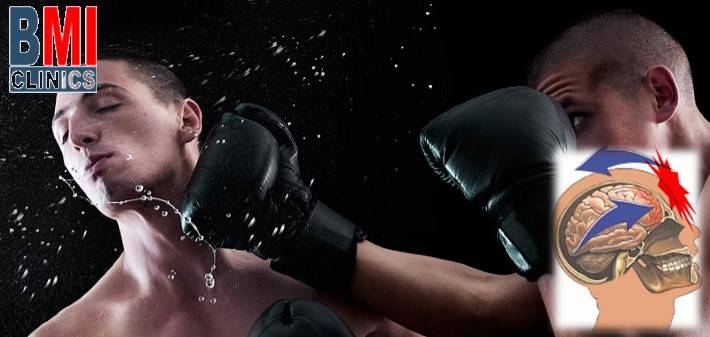The brain is a delicate organ that is cushioned by spinal fluid and protected by a bony shell called the skull. Any direct blow to the head, fall, or injury can jolt the brain inside the skull. This results in damage to blood vessels, nerves, and other tissues of the brain. This type of traumatic brain injury is called a concussion.
Causes of Concussion:
Any kind of trauma or injury to the head region can cause a concussion. This occurs because the brain bangs against the skull and moves around within the head. Brain tissues are bruised and injured. It can result from a fall, a direct blow to the head during an assault or fight, or from an automobile accident. Contact sports such as football, boxing, hockey, and skiing are possible activities that can provoke it. Concussions can occur in children as a result of playground injury or falls.
Symptoms of Concussion:
The symptoms can last from just a few hours to months or even years. They can vary from mild to severe. Loss of equilibrium or balance, blurred vision, and loss of consciousness are some common symptoms associated with a concussion. However, it is not necessary that a person suffering from a concussion will pass out. Therefore, a diagnosis can be missed if other symptoms are ignored.
Some of the mental symptoms include slow thinking, lack of concentration, a foggy mind, and inability to remember new information.
A concussion can also cause physical symptoms such as nausea, vomiting, headache, and dizziness. Blurry vision and sensitivity to light and noise are also symptoms of a concussion. Some people may suffer from balance problems. Lack of energy and feeling fatigued all the time are also reported.
Concussions are also associated with emotional symptoms such as feeling nervous, anxious, or sad. Some people who have suffered a concussion undergo a personality change and are easily angered following the injury.
People may suffer from sleep problems following a concussion. Symptoms include sleeping more or less than usual and having a hard time falling asleep.
Children who have suffered a concussion may complain of persistent headaches and loss of balance. They may exhibit crying spells, temper tantrums, or a sad mood. There may be a loss of newly acquired skills in younger children such as toilet training. Changes in behavior and lack of concentration are also noted in children who have suffered a concussion.
Diagnosis of Concussion:
Anyone who suspects a concussion should seek medical care. A doctor will obtain a history of the injury. The physician may perform some tests to check memory and attention skills. Some objects may be shown to the patient and then hidden. The patient will be asked to recall these items after some time as a test of memory. Problem-solving tests can help a health care provider assess thinking and memory following a head injury. Investigative studies such as a CT scan or MRI scan can help diagnose bruises or bleeding in the brain.
Treatment of Concussions:
The doctor decides whether a person needs to be observed in the hospital or can be followed at home. Family members of the person who has suffered the concussion have to carefully observe for changes in behavior. Emergency medical care may be needed if convulsions, extreme drowsiness, slurred speech, or repeated nausea and vomiting are reported. Confusion, agitation, and restlessness are other symptoms that require medical attention.
There is no specific treatment for concussion other than watchful waiting. People who have suffered a concussion can return to normal activities gradually. They can perform routine work or study as much as their symptoms allow. Treatment also consists of getting plenty of rest and sleep and avoiding alcohol. Strenuous physical activities should be avoided in the first few weeks. The doctor will decide when the patient can drive again. Medication may be prescribed to control pain associated with cuts and bruises.
Prevention of Concussions:
Preventing injury to the head region is the best way of preventing concussions. It is important to wear a seat belt while driving or riding in a car. Do not drive under the influence of alcohol or drugs as this increases the likelihood of an accident and a concussion. Helmets and other safety equipment should be used when playing contact sports. Riding an ATV and other injury-prone activities such as skiing and horseback riding should be done carefully and after adequate training.
Children can be prevented from getting concussions by taking safety precautions. These include car safety seats, playground safety, and street safety. The home should be made safe to prevent falls. Children should use safety devices during sporting activity.









